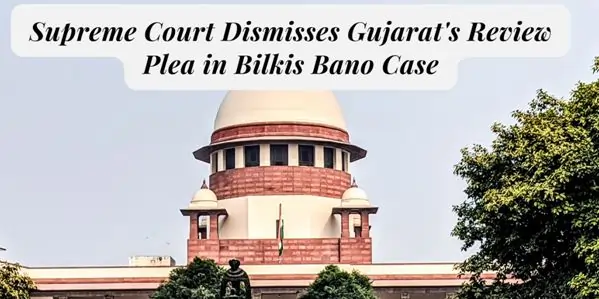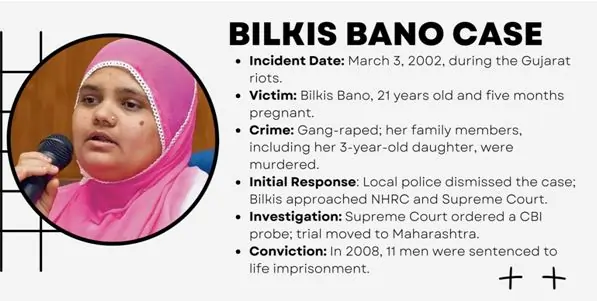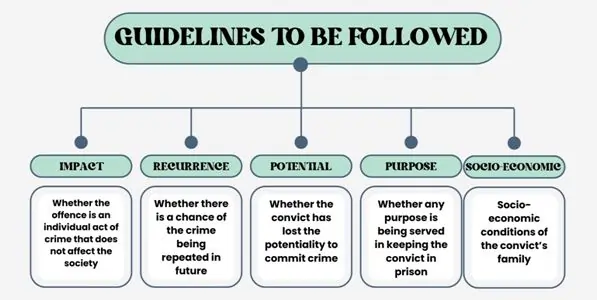
The ruling has come following a major legal twist after the Supreme Court of India rejected a request by the Gujarat government for retrial in the Bilkis Bano case. This ruling reiterates the principle this court has held in the matter of grant of remission in the case of the 11 men sentenced for the gang rape of Bilkis Bano and the murder of seven of her kin during the Gujarat riots of 2002.
The Gujarat government had filed an appeal to Supreme Court by alleging wrong statements made against it in the judgment delivered on January 8. The comments were described as unfounded and tendentious by the state and its request was to have them expunged. Nonetheless, the Supreme Court after a while dismissed the constituted review petition and registry affirming to its prior ruling.
The January 8 verdict had only set aside the remission granted by the Gujarat government to the convicts because the state exceeded its powers. The court pointed out that the power to grant remission in this case rested with the Maharashtra government as the trial was held in the State. The Supreme Courtcancelled the remission in line with the principle of the rule of law and the justice to the people who were affected.
The survivor in this case was 21 years old and five months pregnant woman named Bilkis Bano who represents strength and endurance. These include call for proper and effective victim protection and enforcing the law to its full extent toPager her case has inspired calls for better and proper police protection for victims particularly the heinous cases. The rejection of the review plea by the Supreme Court reflects its willingness to deliver justice on behalf of the people and rebuffs political interferences, and administrative negativity against judicial independence.
This decision is proof that judiciary is a protector of justice and equity. The case is still remembered in the legal history of India as it is still a struggle for justice, and human rights.
What is the Bilkis Bano Case?

Thecase is a horrifying event that took place in the year 2002 Gujarat riots and may be an emotional hook of legal and human rights history of India. At the time the incident took place she was 21 and was pregnant too. She was being raped and in addition to this seven of her kin were being massacred by a mob during the communal riots.
Earlier this week, a group of 20-30 men attacked them near Randhikpur village in Dahod district. Bilkis was gang-raped, and the three year old daughter was among the ones brutally killed. However as we saw earlier, Bilkis survived this and later on sought justice through the law which of course took a very long time.
When she reported her case to local police they neglected so, she never gave up but took her case to the National Human Rights Commission (NHRC) and also to the Supreme Court of India. Supreme Court gave direction to conduct a CBI enquiry and all the accused were arrested as per the investigation by CBI and tried accordingly. This was done to trial the case fairly as shifting trial from Gujarat to Maharashtra was done for this purpose only. In 2008, a special court declared 11 men guilty of rape and murder, and gave them life imprisonment.
As in 2017 when the Bombay High Court affirmed the convictions and dismissed the acquittals of several of the accused police officers and doctors implicated in a conspiracy to tamper with evidence. A decade later, in 2019 the Supreme Court asked the Gujarat government to pay Bilkis Bano ₹50 lakh, give her a government job, and house from the government.
However, what was a very contentious decision was that the Gujarat state in 2022 reduced their sentences to a remission and the convicts were released. This decision was severely criticized and the act was taken to the Supreme Court recently, where it has rejected out Gujarat government’s review plea, reaffirming the importance of justice and responsibility.
What is Remission?
Remission in Indian Judicial system of law is a provision, under which a part of the remaining sentence is reduced but the kind of sentence remains the same. This is indeed a mechanism that is expected to bring consolation to prisoners who meet other peculiar standards or good behaviour during their detention.
Types of Remission
- Ordinary Remission: This type of remission is given on a regular basis to the prisoners who had shown good disciplining in the prison. It is usually given once a year based on completion, completion of assignments, and over all behaviour, etc.
- Special Remission: There are also general remissions for particular circumstances including on national holidays, important events or on particular day. This type of remission is often announced by the government as a morale effort.
- State Remission: The power to grant remission under the Indian Constitution is vested with the President and the Governors of states. Pardons, reprieves, respite or remission of punishment may be done by Article 72 for the President, while for the Governors it lies under Article 161. If it involved state laws or state has much concern with case, this type of remission is used.
- Judicial Remission: In certain circumstances the judiciary itself may advise remission. This sometimes happens when a court influences that the convict has gone half or nearly half of the sentence least and has been a good person. After a trial, the court may introduce a suggestion of remission to the competent authority in the Government.
Constitutional provisions related to Remission
Remission is an important feature of the Indian legal system as it permits the shortening of a prisoner’s term without altering the type of the initial punishment. The provisions for remission are largely contained in Article 72 and 161 of the Indian constitution.
Article 72: Powers of the President
Article 72 of the constitution of India empowers the President of India to give pardons, reprieves, respites or remissions of punishment for offenses. This power applies where the punishment or sentence imposed is by Court Martial, where the Offence involves a breach of law concerning subjects to which the executive power of the Union extends and where the punishment is a capital punishment. The President of the Republic decides on legal matters under his/her supremacy but not arbitrarily, especially because such a decision has to be made under the Council of Ministers advice.
Article 161: Powers of the Governor
Likewise, Constitution Article 161 intended to give the Governor of the state the power to grant pardons, reprieves, respites or remission of the punishment or suspending, remitting or commuting the punishment passed on any person convicted of any offense against any law relating to any matter in which the executive power of the state will extend to. This provision makes it possible for the states use their power and decide on the matters of remission within their jurisdiction which shows the strong federal character of Republic of India.
Legal Framework and Judicial Oversight
Apart from these constitutional provisions, the Code of Criminal Procedure (CrPC), 1973 more particularly Section 432 contain provisions relating to the remission of sentences. In this section, the desirable government can reduce or cancel the sentences provided that it meets set-down conditions. The decision on the remission must be well thought out, rational, and just so that it does not prejudice the orderly dispensation of justice.
Another even more important function of the judiciary concerns supervising the use of remission powers. There is no law, as mentioned earlier, that prohibits the two organs from reviewing the decision of the executive. Such judicial control is supreme in order to reconcile discretion with legal order on one hand and with principles of justice and equity on the other hand.
Guidelines to be followed

In India, there are procedures according to which remission can be granted not to prejudice the above sentiments but to uphold justice. There are five important directions that were given by the Supreme Court of India in Laxman Naskar v Union of India (2000) case regarding the criteria to be followed while considering the matter of remission of the convicts. This way, the criteria of granting remission is socially fair and just.This acts in accordance to the principles of justice. These are mentioned below:
- Impact on Society: The court stressed to pay attention to the nature of the offense committed especially whether the offense committed is isolated from the rest of society and is not a systematic violation of law. Specifically, those criminal offenses that have potential social consequences are less likely to be considered for remission.
- Recurrence of Crime: The Agencies have to consider the risk of the convict reoffending in the future. In cases where one is most likely to repeat the same mistakes then remission should not be granted. This helps to ensure that some of the safety/ security risks within society.
- Potential for Reform: The chance that the convict will re-offend is one of the most important ones. An application for remission can be considered if the convict has rehabilitated his\her character and behaviour pattern. This guideline should serve to remind that rehabilitation is a potent part of the criminal justice system.
- Purpose of Continued Confinement: The court emphasised the need to determine whether any constructive purpose is served by continuing to confine the convict. If the convicted has remained in prison for a considerable period of time and bears good behaviour, then he may be given remission.
- Socio-Economic Conditions: Concerning the family background of the convict, socio-economic status of the convict’s family is also considered. If the family is in need and the convict release will help, then can be considered for remission. This guideline bears some light of the humanitarian side of Indian Judicial System.
Such guidelines prevent the process of granting remission from being bias as each case is as wholly reviewed.These guidelines, therefore, will ensure that while considering the principle of justice and Mercy in remission, society is served with justice.